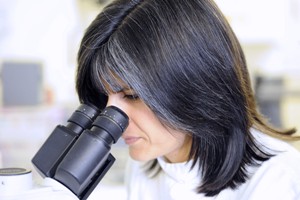Eating salmon while pregnant affects contents of mother's milk
Release Date 03 August 2012

Mothers who eat more salmon before giving birth boost levels of a vital nutrient in their breast milk, but could lower levels of disease-fighting antibodies they pass on while feeding their baby, researchers have found.
Long-chain omega-3 fatty acids, found in oily fish such as salmon, are crucial during early childhood development when they are needed for optimal growth and development. As well as being important for the growth of a baby's brain and eyes, they may also help the development of healthy blood vessels, heart, and immune system. As a result, pregnant women are encouraged to eat several servings a week of certain kinds of oily fish known to provide high levels of omega-3.
However, very little is known about the influence of eating oily fish during pregnancy on the omega-3 fatty acid content of the mother's milk, and on immune substances, such as the antibodies passed from mother to baby during breastfeeding. The protection against infection that this provides to vulnerable newborns is one of the reasons why breastfeeding is strongly recommended by health professionals in the first months after birth.
A European consortium of researchers, led by the University of Reading and the University of Southampton in the UK, collaboratively conducted a dietary intervention study in which pregnant women were randomly assigned to eat their normal diet, or one high in salmon.
Researchers found that those mothers that had eaten salmon during the latter stages of their pregnancy increased the proportion of long-chain omega-3 fatty acids in milk throughout the first month after birth, but also lowered levels of secretory immunoglobulin-A (sIgA) - an important antibody that helps protect the newborn against infection.
Findings from the study are published in the August 2012 issue of The Journal of Nutrition.
Lead researcher Parveen Yaqoob, Professor of Nutritional Physiology at the University of Reading, said: "Pregnant women in the UK are currently advised to eat one or two servings of oily fish a week, while limiting tuna and avoiding shark, swordfish and king mackerel. This is intended to balance the need for sufficient levels of omega-3-rich food while limiting foods that might contain high levels of mercury.
"While our study showed that pregnant women with diets high in oily fish passed on useful nutrients to their babies while breastfeeding, more research is needed to examine how the resulting lower levels of antibodies in breast milk could biologically affect young infants.
"From this study, it is positive to note that by following the current guidance on oily fish consumption during pregnancy, women can boost beneficial nutrients to help the early growth of their babies at a crucial stage of development. Breast milk contains a number of ingredients which contribute to immunity, and from this work we cannot say if the reduction in one type of antibody would have any effect on a baby's health."
ENDS
For more information contact Pete Castle at the University of Reading press office on 0118 378 7391 or p.castle@reading.ac.uk.
Notes to editors:
Reference: Urwin HJ, Miles EA, Noakes PS, Kremmyda L-S, Vlachava M, Diaper ND, Pérez-Cano J, Godfrey KM, Calder PC, Yaqoob P. ‘Salmon consumption during pregnancy alters fatty acid composition and Secretory IgA concentration in human breast milk', Journal of Nutrition 142:1603-1610, 2012. Read the abstract here >>>
This investigation was part of the ‘Salmon in Pregnancy Study,' which forms part of the EU Project ‘Sustainable Aquafeeds to Maximize the Health Benefits of Farmed Fish for Consumers' (AQUAMAX). It was designed to assess the health effects of oily fish consumption in pregnant women whose children were at high risk for developing common inflammatory diseases, such as asthma and allergies.
For this study, participants either continued with their typical dietary patterns, or incorporated two servings weekly of farm-raised salmon, from 20 weeks of pregnancy until birth. Researchers collected breast milk samples several times during the first month after birth, analysing the milk for its content of fatty acids and a selected group of immune markers.
The University of Reading is ranked among the top 1% of universities in the world (THE World University Rankings 2011-12) and in the best 25 universities in the UK (Times, Guardian). The Department of Food and Nutritional Sciences at Reading is the largest University department of its kind in the UK, combining state of the art teaching facilities, clinical nutrition unit, labs and the largest pilot processing plant in the country. The department is internationally recognised for the quality of its research.
